Sylvie Germain - Magnus
Здесь есть возможность читать онлайн «Sylvie Germain - Magnus» весь текст электронной книги совершенно бесплатно (целиком полную версию без сокращений). В некоторых случаях можно слушать аудио, скачать через торрент в формате fb2 и присутствует краткое содержание. Год выпуска: 2008, Издательство: Dedalus Ltd, Жанр: Современная проза, на английском языке. Описание произведения, (предисловие) а так же отзывы посетителей доступны на портале библиотеки ЛибКат.
- Название:Magnus
- Автор:
- Издательство:Dedalus Ltd
- Жанр:
- Год:2008
- ISBN:нет данных
- Рейтинг книги:3 / 5. Голосов: 1
-
Избранное:Добавить в избранное
- Отзывы:
-
Ваша оценка:
- 60
- 1
- 2
- 3
- 4
- 5
Magnus: краткое содержание, описание и аннотация
Предлагаем к чтению аннотацию, описание, краткое содержание или предисловие (зависит от того, что написал сам автор книги «Magnus»). Если вы не нашли необходимую информацию о книге — напишите в комментариях, мы постараемся отыскать её.
Magnus — читать онлайн бесплатно полную книгу (весь текст) целиком
Ниже представлен текст книги, разбитый по страницам. Система сохранения места последней прочитанной страницы, позволяет с удобством читать онлайн бесплатно книгу «Magnus», без необходимости каждый раз заново искать на чём Вы остановились. Поставьте закладку, и сможете в любой момент перейти на страницу, на которой закончили чтение.
Интервал:
Закладка:
Sylvie Germain
Magnus
THE AUTHOR
Sylvie Germain was born in Chateauroux in Central France in 1954. She read philosophy at the Sorbonne, being awarded a doctorate. From 1987 until the summer of 1993 she taught philosophy at the French School in Prague. She now lives in Pau in the Pyrenees.
Sylvie Germain is the author of eleven works of fiction, ten of which have been published by Dedalus. Her works of non-fiction include a study of the painter Vermeer, a life of the 20th-century Dutch mystic Elly Hillesum, a portrait of Warsaw, and a religious meditation. Her work has been translated into over twenty languages and has received worldwide acclaim.
Sylvie Germain’s first novel The Book of Nights , was published to France in 1985. It has won five literary prizes as well as the TLS Scott Moncrieff Translation Prize in England. The novel’s story is continued in Night of Amber , which came out in 1987. Her third novel Days of Anger won the Prix Femina in 1989. It was followed by The Medusa Child in 1991 and The Weeping Woman on the Streets of Prague in 1992, the beginning of her Prague trilogy, continued with Infinite Possibilities in 1993 and then Invitation to a Journey ( Eclats de sel ). The Book of Tobias saw a return to rural France and la France profonde, followed in 2002 by The Song of False Lovers ( Chanson des Mal-Aimants ).
Magnus , published in 2005, has won several prizes in France including the Goncourt Lycéen Prize, which is selected from the 12 novels on the Goncourt shortlist by 15–18 year old students at French High Schools. It was also shortlisted for the Grand Prix du Roman de L’Académie Française.
THE TRANSLATOR
Christine Donougher read English and French at Cambridge and after a career in publishing is now a freelance translator and editor.
Her translation of The Book of Nights won the 1992 Scott Moncrieff Translation Prize.
Her translations from French for Dedalus are: 7 novels by Sylvie Germain, The Book of Nights, Night of Amber, Days of Anger, The Book of Tobias, Invitation to a Journey, The Song of False Lovers and Magnus, Enigma by Rezvani, The Experience of the Night by Marcel Béalu, Le Calvaire by Octave Mirbeau, Tales from the Saragossa Manuscript by Jan Potocki, The Land of Darkness by Daniel Arsand and Paris Noir by Jacques Yonnet. Her translations from Italian for Dedalus are Senso (and other stories), Sparrow and Temptation (and other stories) .
MAGNUS
To Marianne and
Jean-Pierre Silvéréano
What has not been said at the proper time is perceived at other times as pure fiction.
Aharon AppelfeldPrelude
A meteorite explosion may yield a few small secrets about the origins of the universe. From a fragment of bone we can deduce the structure and appearance of a prehistoric animal; from a vegetal fossil, the presence long ago in a now desert region of a luxuriant flora. Infinitesimal and enduring, a plethora of traces survive time out of mind.
A scrap of papyrus or a shard of pottery can take us back to a civilization that disappeared thousands of years ago. The root of a word can illuminate for us a constellation of derivations and meanings. Remains, pit-stones always retain an indestructible kernel of vitality.
In every instance, imagination and intuition are needed to help interpret the enigmas.
Take a man whose memory is defective, long steeped in lies then distorted by time, plagued with uncertainties, and one day all of sudden made incandescent, and what kind of story can you write about him?
A sketch portrait, a confused narrative, punctuated with blanks, gaps, underscored with echoes, and ultimately fraying at the edges.
Never mind the confusion. The chronology of a human life is never as linear as is generally believed. As for the blanks, gaps, echoes and frayed edges, these are an integral part of all writing, as they are of all memory. The words of a book are no more monolithic than the days of a human life, however abounding these words and days might be, they just map out an archipelago of phrases, suggestions, unexhausted possibilities against a vast background of silence. And this silence is neither pure nor tranquil; there is an underlying murmur, a continuous whispering. A sound rising from the confines of the past to mingle with the sound gathering from all reaches of the present. A breeze of voices, a polyphony of whisperings.
Inside every person the voice of a prompter murmurs in an undertone. Incognito. An apocryphal voice that if you only lend an ear may bring unsuspected news — of the world, of others, of yourself.
To write is to descend into the prompter’s box and learn to listen to the breathing of language in its silences, between words, around words, sometimes at the heart of words.
Fragment 2
On every object, every person, including his parents, he poses a gaze full of candour and amazement, studying everything with close attention. The gaze of a convalescent who has come close to death and is relearning to see, to speak, to name things and people. To live. At five years of age he fell seriously ill and the fever consumed all the words inside him, all his recently acquired knowledge. He is left with not a single recollection. His memory is as blank as the day he was born. However, it is sometimes traversed by shadows that come from he knows not where.
His mother, Thea Dunkeltal, devotes her entire time to reeducating her amnesiac and unspeaking child. She teaches him his language once again and gradually restores to him his lost past, recounting it episode by episode, like a story told in instalments of which he is the central character and she the good queen looking after him. She delivers him into the world for the second time by the sole magic of the spoken word.
In this fairy-tale by instalments, like all fairy-tales a spellbinding blend of the fearsome and the marvellous, every member of his family has the stature of a hero: he as the victim of a galloping fever that he has nevertheless managed to overcome; his mother in the role of the good fairy; his father that of a great doctor. In addition to this trio are two other characters, even braver and more admirable, who are his mother’s younger brothers, killed in the war. It is his duty to acknowledge them with pride and gratitude for evermore. Because it was for him they sacrificed themselves by going off to fight in a distant land where the men are as cruel as the climate, so that he might grow up in a country of power and glory. And the child, who confuses the words ‘enemy’ and ‘illness’, imagines that his warrior uncles died battling against his illness, died of cold and exhaustion driving back the fever-foe into an icy waste so as to extinguish its burning heat. Bearing their first names, he meekly allows himself to be transformed into the living mausoleum of these two heroes.
Seductive as this family epic full of nobility and sadness might be, it nevertheless suffers from one defect that, although apparently small, greatly upsets the child: his mother grants no place in it to Magnus, whom she treats in fact with scorn, even revulsion. However, Magnus and he, Franz-Georg, are inseparable. So he secretly introduces his companion into the legend, inventing scenes for him murmured at length into his ear (the one that bears traces of burning, to soothe it) when they are alone together. Scenes in which Magnus has a role equal to his own.
Читать дальшеИнтервал:
Закладка:
Похожие книги на «Magnus»
Представляем Вашему вниманию похожие книги на «Magnus» списком для выбора. Мы отобрали схожую по названию и смыслу литературу в надежде предоставить читателям больше вариантов отыскать новые, интересные, ещё непрочитанные произведения.
Обсуждение, отзывы о книге «Magnus» и просто собственные мнения читателей. Оставьте ваши комментарии, напишите, что Вы думаете о произведении, его смысле или главных героях. Укажите что конкретно понравилось, а что нет, и почему Вы так считаете.












